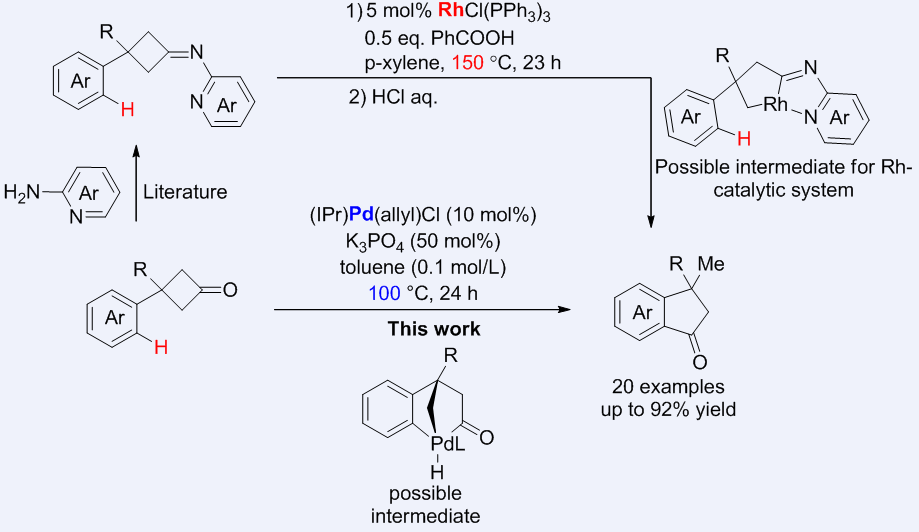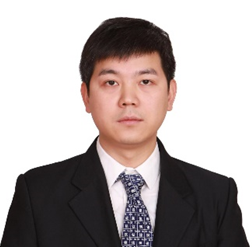Palladium-Catalyzed Skeletal Reorganization of Cyclobutanones Invoving Successive C—C Bond/C—H Bond Cleavage
Ruirui Li, Xiaonan Shi, and Dongbing Zhao*

The utilization of cyclobutanonesas the synthon in transition metal catalysis has been made great success. Because C(carbonyl)−C bond of cyclobutanones can be cleaved through strain release. Despite those advancements, the main catalysts in literature are Rh catalysts or Ni catalysts and the reaction with C—H bond is still underdeveloped. Herein, we realized the first palladium-catalyzed skeletal reorganization of cyclobutanones involving successive cleavage of C(carbonyl)−C bonds and C—H bond cleavage, which constitutes an rapid access to diverse indanones. In contrast to the previous Rh-catalytic system, the Pd-catalytic system herein involves different mechanism and features several advantages: 1) no need of directing group to facilitate the C(carbonyl)−C bond cleavage; 2) much milder reaction condition and 3) simplified work-up.
Cyclobutanones | C—C activation | C—H activation | Palladium catalysis | Ring expansion
钯催化下连续的C‒C/C-H键断裂实现环丁酮骨架重组
过渡金属催化张力环的开环扩环反应是有机合成中构建重要分子骨架的有力合成工具,近年来,南开大学赵东兵团队在该领域做出了卓越的贡献(Angew. Chem. Int. Ed. 2018, 57, 6329; Angew. Chem. Int. Ed. 2020, 59, 8481; Nat. Commun. 2022, 13, 3392; Angew. Chem. Int. Ed. 2021, 60, 25723; Nat. Chem. 2021, 13, 1006.)
环丁酮由于具有较大的环张力,过渡金属可以通过氧化加成插入C(C=O)‒C键,形成五元环金属中间体,从而发生后续转化,构建复杂多样的有机分子。但目前文献报道的该五元环金属中间体参与的反应主要局限于与不饱和键(烯烃、炔烃或羰基等)反应。总结起来,过渡金属催化的环丁酮的反应虽然已经取得了不错的进展,但仍存在一些限制:1)反应中主要使用金属铑或镍催化;2)C‒H键活化参与的反应仍有待发展。在已知的报道环丁酮与C‒H键的反应中,需要使用铑催化,而且需要较高的温度(150 °C)和当量的吡啶原位生成导向基团(Chem. Commun. 2015, 51, 7393)。
最近,李瑞瑞博士和史晓楠同学通过(IPr)Pd(allyl)Cl催化对环丁酮C(C=O)‒C键氧化加成生成5元环戊酮金属中间体,该中间体发生分子内的C(sp2)‒H键活化,生成双环桥型金属中间体,随后通过还原消除获得茚酮类化合物。这类反应具有不需要导向基团并且反应条件温和的特点,为茚酮的高效合成提供了可靠的方法。值得一提的是,这是首例证明环丁酮C(C=O)‒C键可以被钯催化剂氧化加成形成五元环金属物种的研究。
图1. 钯催化通过连续的C‒C/C-H键断裂重组环丁酮骨架
上述研究结果作为Report发表于Chin. J. Chem. 2023, 41, 1679—1683. DOI: 10.1002/cjoc.202300044。该项工作得到了国家自然科学基金委、海河可持续化学转化实验室、国家重点研发计划和南开大学的资助。

Left to Right:
Dr. Ruirui Li; Mrs Xiaonan Shi, Prof. Dr. Dongbing Zhao

赵东兵:现为南开大学元素有机化学国家重点实验室独立PI。本科及博士均毕业于四川大学,曾获得国家自然科学优秀青年基金资助。课题组主要开展“元素化学”与“功能材料”化学的交叉研究,取得系列学术成果,作为通讯作者发表SCI论文30余篇,其中包括Nature Chemistry, Nature Synthesis, Angew. Chem. Int. Ed., J. Am. Chem. Soc.等。